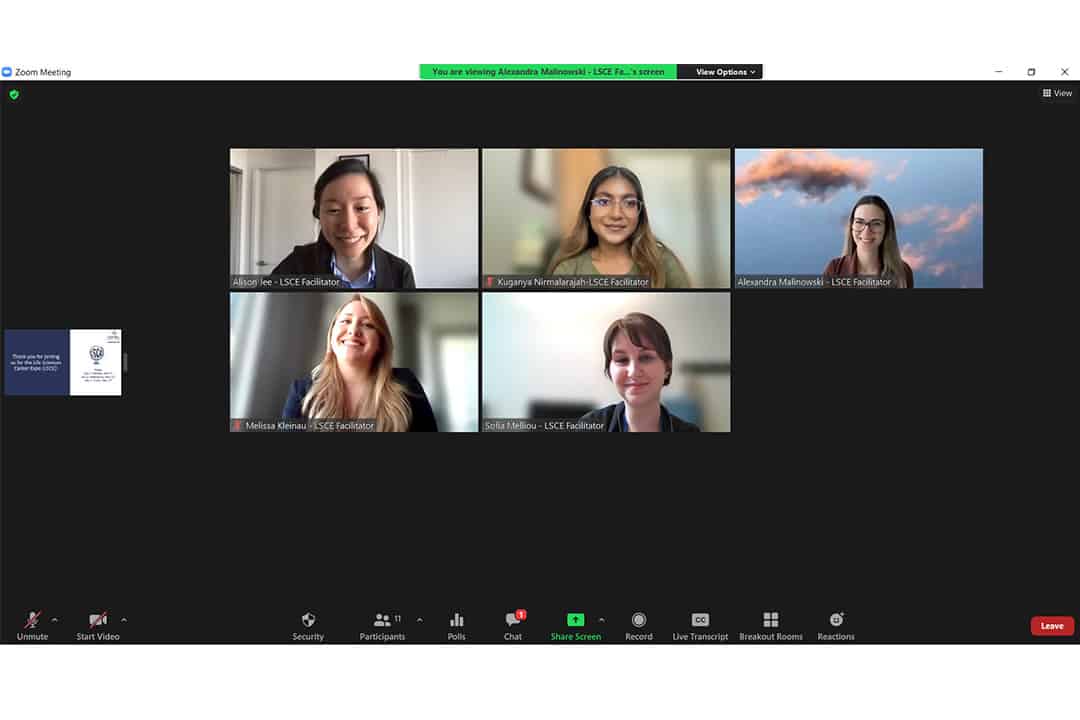The week of May 9 brought with it the Life Sciences Career Expo (LSCE) 2022, a virtual event held by the Life Sciences Career Development Society (LSCDS) at the University of Toronto. The event featured over 20 different sessions and workshops which taught attendees about the types of careers and future opportunities that are available to life sciences graduates.
The LSCDS is managed entirely by graduate students and is “the largest and only Faculty of Medicine recognized career development society.” It aims to showcase a diverse range of potential career pathways for graduate students to explore by bringing together graduate students, research associates from U of T, and educators from hospitals.
As advertised on its website, the LSCE was organized to “bring together students and postdoctoral fellows with educators, researchers, industry partners and government stakeholders,” as well as prepare the next generation of researchers and experts in their fields. The event provided students and trainees with the opportunity to explore diverse career paths and network with professionals while learning professional skills through various workshops, networking events, and keynote speeches.
During the expo, attendees had the opportunity to attend sessions focused on a variety of themes to help students learn more about possible career paths. Further, the attending companies were able to promote themselves to a large talent pool of new and soon-to-be graduates.
The ‘Company Spotlights’ sessions turned out to be fantastic ways for students to interact with companies in a variety of fields and find new places to work. Companies from several sectors attended the event, including those in biotechnology, medical communications, consulting, education, and pharmaceuticals.
During these sessions, representatives from these companies introduced their work, allowing students to gain a better understanding of the fields and technologies that are currently relevant in the field.
A Q&A period followed these presentations, during which students were able to gain new insights into the industry. Students and panelists alike left these sessions with new contacts and larger networks of people to reach out to and continue learning from, even after the expo.
The expo also offered ‘Coffee Chats’ during the last days of the event, where attendees had the chance to network one-on-one with professionals, gather information about different industries and organizations of interest, and establish meaningful connections.
Aside from networking and learning about their fields of interest, students also had the opportunity to work on job-related skills. Throughout the expo, there were various workshops, including those explaining how to write a cover letter and résumé, prepare for a job interview, and approach online networking. These are skills that are instrumental when entering any field, and the expo did a great job at highlighting these skills’ importance and bringing on experts to provide the required support.
Each of these workshops had panelists with significant experience in their respective fields, which helped enhance the experience for attendees. The workshops for cover letters and résumés, for example, brought on hiring managers who were able to point out key features they look for, thereby helping students understand how to optimize their résumés for these screenings.
Beyond these workshops, interested attendees could participate in mock interviews. The LSCDS invited hiring managers to provide trainees with the opportunity to practice their interview skills and receive immediate feedback on ways to improve.
Attendees took a more intimate look at the day-to-day life in medical affairs and management consulting. The expo held job simulations, where the attendees could carry out common tasks relating to the position at hand in order to gain a better understanding of operations within the showcased companies.
The management consulting simulation allowed students to participate in a mock consulting task and discuss various creative methods to approach cases. Students also had the opportunity to analyze common problems that clients have and develop strategies to address them.
The medical affairs simulation gave students the opportunity to participate in interactive activities that explored different areas of the medical affairs industry. The simulation showcased how the industry involves several other fields — from communication to strategic planning — alongside life sciences education, as well as how rapidly the field is growing. Students learned about regulations that need to be kept in mind in medical affairs, including the Code of Ethical Practices and the Pharmaceutical Advertising Advisory Board’s Code of Advertising Acceptance.
Overall, the LSCE provided attendees with incredible opportunities to learn and grow. Thanks to the LSCDS, students were able to explore diverse career pathways and prepare for future jobs.


